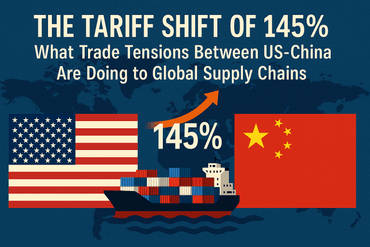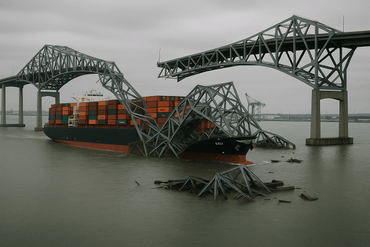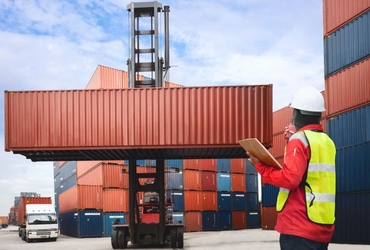
Maersk and Alibaba team up



Maersk and Alibaba team up
The world’s largest shipping line and retailer have teamed up - digitally. Denmark’s Maersk Line and China’s Alibaba have engaged in an agreement perhaps representing the digital era of the ocean freight industry. Under the agreement, Maersk, the shipping industry’s leading carrier, can list their freight spaces on Alibaba’s import/export platform, which allows Chinese shippers to make shipping reservations online.
The new service, named OneTouch, went live on December 22, 2016.
*UPDATE (15/2/2017): CMA CGM joins Maersk in Alibaba team up. Its proposal with Alibaba involves the provision of a direct online booking platform for Chinese customers’ shipments to the Mediterranean and the Adriatic.
Alibaba’s OneTouch
According to Alibaba’s website, OneTouch “is an import and export service provider and an Alibaba affiliate”. Alibaba acquired the OneTouch platform in 2010, which will facilitate booking transactions. As Alibaba’s fastest growing unit in its B2B division, the platform mainly provides Chinese exporters with online booking services such as air freight and parcel services. Like a freight forwarder, it also includes help with customs clearances and logistics.
The new service will first be launched on selected ports and routes. That includes services from eight Chinese ports, including Ningbo and Shanghai, to other Asian and European ports.
“The initial launch …allows existing Alibaba OneTouch (registered) users to lock in the price of required cargo spaces on selected routes by pre-paying a deposit amount.” – Maersk
This is perhaps one of the toughest aspects of this partnership. With this move, Maersk appears to target small and medium enterprises. However, larger businesses may not be as willing to prepay as they’re simply not used to working in this manner.
“There has to be a benefit of paying upfront. If you don’t provide a clear additional service including an easy way to quote and book with logistics services such as inland transportation, customs and insurance, it’s going to be tough.” – Carlos Hernández, Co-founder, iContainers
Logistics and E-commerce
Clearly, this move exemplifies the increasing cooperation between logistics and e-commerce companies. While this is the first such cooperation, we’ve actually already seen similar movements floating in the waters. E-commerce companies have been knocking at the doors of the logistics industry for some time now as they try to gain a tighter control over their logistics chain. In March 2016, Amazon registered itself as a Chinese business to function as a freight forwarder. It has even leased aircraft to manage its own shipments in the US.
Of course, what this means for Chinese shippers is that they no longer have to go through freight forwarders to reserve space for their goods on Maersk’s vessels. This further dates the traditional method of moving freight.
“In Drewry’s opinion, the Maersk-Alibaba partnership is more a new business stream than a disruption. This new stream may accelerate digital practices along certain trade routes, for East/West or short sea container shipping services. We anticipate that technology in trade and transport document digitization, near real-time tracking and cargo monitoring devices will soon facilitate the creation of integrated services and routes with expedited customs and documentary compliance.”
– Philip Damas, Head of Supply Chain Advisors Practice, Drewry
Effect on Freight Forwarders
According to Maersk, this tie-up with Alibaba was not aimed at eliminating the role of freight forwarders. It says that simply ties in with its strategy of providing digitalized services for its customers. Looking to the future, it has further plans to expand this service to other third-party portals.
It is easy to see what is in it for Maersk. It is a blow at the forwarders. “See, we don’t need you!”
– Andrew Craig-Bennett for Splash24/7
Despite an increasing trend of logistics and e-commerce tie-ups, freight forwarders remain an integral part of the shipping industry. They offer more than just spots on vessels. Companies like iContainers provide services like customs, warehousing, and distribution. In short, the advantage freight forwarders hold is the ability to engage more personally with clients; they have the capacity to understand what clients need.
“Shipping lines still need freight forwarders because they’re their biggest clients. Going directly to small end customers is something that’s not in their nature yet because they have to change they way they sell the service.** As freight forwarders, we have the knowledge to adapt the services to their needs through technology and they will need a change of mentality of their customer service**. “
– Carlos Hernández, Co-founder, iContainers
E-logistics
That’s not to say that we can ignore the importance of technology in today’s logistics world. This Maersk and Alibaba tie-up is likely to be the first of many logistics and e-commerce partnerships we can expect to see in the near future. That said, it’s important for companies to continue investing in technology to be as efficient as the market’s biggest players. Freight forwarders, can, however, take advantage of the synergies created from such deals.
“If shipping lines continue down this road, companies like iContainers can benefit because it’s going to be easier for us to be linked to the services that they’re providing. The vast majority of the services are not connected through API or other technologies yet. The more they invest, the easier it is going to be for us to get what they’re offering and readapt it to SMEs. “_
– Carlos Hernández, Co-founder, iContainers
Alibaba: Making gains
In April 2016, Alibaba overtook rival Walmart to become the world’s largest retail platform. It recorded sales of $15.68 billion for its 2016 fiscal year ending in March, which surpassed Walmart’s annual sales. Investments-wise, it has, in recent years, made billions of dollars worth of advances in the logistics sector. Those include purchasing warehouses and buying stakes in couriers. Here’s to name a few:
- Partnership with the United States Postal Service (USPS)
- 47% stake in Cainiao, which handles 70% of China’s deliveries
- Invested $300 million into Singapore’s postal service, SingPost
- Holds a minority stake in Shanghai’s YTO-Express (which handled eight million parcels on a daily basis in 2015)
- Control of Chinese department store chain Intime which it bought for $2.6 billion
“Alibaba has a lot of customers who don’t understand logistics, so Maersk can quote them the rack rate and get an upfront deposit (rare in the industry). The customer will need to arrange trucking on both sides of the shipment, via a freight forwarder. Conveniently, Alibaba has a freight forwarder — Cainiao. It’s unclear how the customer would handle wanting to use their own freight forwarder…finding a freight forwarder can be a time-consuming process for many small sellers. “
Matt Tillman, Founder of Haven
@EEPhillips_WSJ @qz Progress! But basically maersk and alibaba have joined forces to become @iContainers.
— Matt Tillman (@mtillman) January 5, 2017
Maersk’s movements
How much of a success will this tie-up bring for Maersk? For years, Maersk has targetted its services towards big companies. With this move, SMEs may give them a chance due to the convenience of this setup. But the question is just how patient they will be.
“When I was at Shipco, about half the bookings we got based on Maersk were from forwarders who needed Maersk’s services but did not want to deal with them. So they would use us even if it meant paying more to avoid dealing with Maersk directly. Even for people who know what they’re doing and know how Maersk operate, it’s still incredibly difficult to work with them. You pretty much need to have contacts within Maersk to help you get even the smallest tasks done.
But I think the model itself is a step in the right direction towards a more transparent industry.”
– Klaus Lysdal, VP Sales & Operations, iContainers
This is perhaps the latest in the Danish company’s efforts to go against the economic downturn. Following Hanjin Shipping’s collapse, Maersk announced its refocus to acquisitions instead of ordering new ships. Towards the end of 2016, it announced its acquisition of Hamburg Süd. Also, along with its 2M partner MSC, it engaged in a strategic cooperation with South Korea’s HMM.
"What Maersk is realizing is that the market is changing. Logistically, they’re trying to be more efficient and reduce costs. E-commerce wise, they are using technology to target clients that they were not able to and/or interested to provide their services to before."
– Carlos Hernández, Co-founder, iContainers
Read our co-founder, Carlos Hernández' full thoughts on the partnership here
Related Articles


